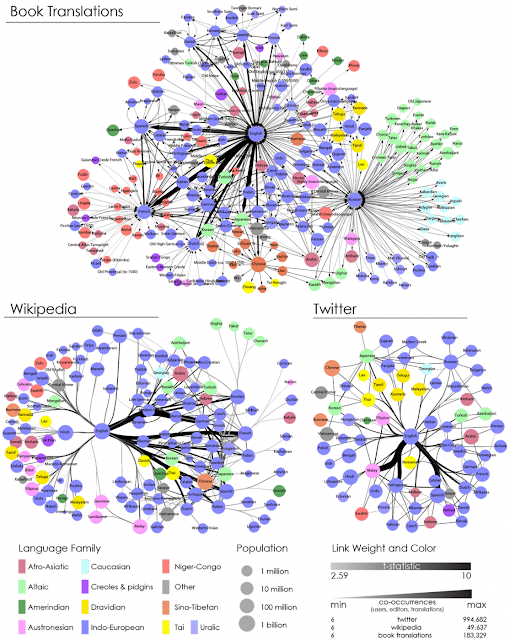Which are the world's most influential languages? Languages With Historical and Colonial Influence.
What makes a language influential? Is it
one with the most speakers? Or perhaps it's the language with the most economic
influence? English has certainly been seen as the “international language” for
some time now, and many have stressed the importance of learning Mandarin as
China’s economy continues to grow.
But according to one group of scholars, including cognitive
scientist and linguist Steven Pinker, whether or not a language is influential
is less about that language itself, and more about how it connects to others.
Publications, old and
new
To establish how
languages are connected, the scholars looked at three forms of writing. If
someone, a journalist for example, wants their story to go global, they will
most likely print the story in their native language, as well as in those
languages they think will have the biggest reach.
First, they looked at
over 2.2 million book translations between 1979 and 2011, which were made in
over 150 countries and more than a thousand languages. They then looked at
which edits to Wikipedia were being done in more than one language, scanning
382 million edits in 238 languages by 2.5 million editors. Finally, they turned
to Twitter, looking at 550 million tweets in 73 languages written by 17 million
users – more than 10% of Twitter’s active user base.
English is still king
If researching a
global language network shows one thing, it's that English remains the number
one most connected language in the world. After English, however, there was no
single global network, but rather three sets of smaller networks around the
world, linked together by languages that have had historical and colonial
influence, such as French, Spanish, German, Russian, Portuguese and Chinese.
Linguistic isolation?
If Chinese is the most
spoken language in the world, why doesn’t it find itself closer to English in a
global language network? The answer is that while there are more Chinese people
online than any other nationality on Earth, they are primarily using websites
made by the Chinese for the Chinese, making for a sort of linguistic isolation.
Mandarin’s influence is not spreading because, in large part, it's limited to
networks such as Sina Weibo (Chinese Twitter) and Baidu Baike (Chinese
Wikipedia). A similar phenomenon can be seen in Russia, where VK (Russian Facebook)
is used more than many global social networks.
Arabic, despite its
undeniable importance, did not score as highly as other languages when it comes
to the flow of translated information.
Twitter has allowed for less widely spoken languages to grow in influence
The researchers also
found that Twitter has allowed for less widely spoken languages to grow in
influence. In the study’s Twitter dataset, languages such as Malay, Filipino
and Swahili had larger than expected shares, indicating that “informal”
channels were more widely used among speakers.
Source: World Economic Forum



Comments
Post a Comment